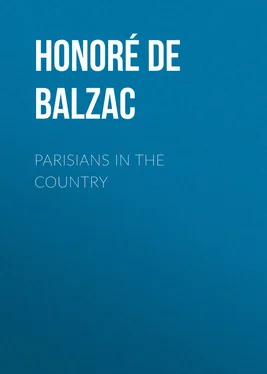Honoré Balzac - Parisians in the Country
Здесь есть возможность читать онлайн «Honoré Balzac - Parisians in the Country» — ознакомительный отрывок электронной книги совершенно бесплатно, а после прочтения отрывка купить полную версию. В некоторых случаях можно слушать аудио, скачать через торрент в формате fb2 и присутствует краткое содержание. Жанр: literature_19, foreign_antique, foreign_prose, на английском языке. Описание произведения, (предисловие) а так же отзывы посетителей доступны на портале библиотеки ЛибКат.
- Название:Parisians in the Country
- Автор:
- Жанр:
- Год:неизвестен
- ISBN:нет данных
- Рейтинг книги:4 / 5. Голосов: 1
-
Избранное:Добавить в избранное
- Отзывы:
-
Ваша оценка:
- 80
- 1
- 2
- 3
- 4
- 5
Parisians in the Country: краткое содержание, описание и аннотация
Предлагаем к чтению аннотацию, описание, краткое содержание или предисловие (зависит от того, что написал сам автор книги «Parisians in the Country»). Если вы не нашли необходимую информацию о книге — напишите в комментариях, мы постараемся отыскать её.
Parisians in the Country — читать онлайн ознакомительный отрывок
Ниже представлен текст книги, разбитый по страницам. Система сохранения места последней прочитанной страницы, позволяет с удобством читать онлайн бесплатно книгу «Parisians in the Country», без необходимости каждый раз заново искать на чём Вы остановились. Поставьте закладку, и сможете в любой момент перейти на страницу, на которой закончили чтение.
Интервал:
Закладка:
“You!”
“Why shouldn’t I be the Baron Gaudissart, peer of France? Haven’t they twice elected Monsieur Popinot as deputy from the fourth arrondissement? He dines with Louis Phillippe. There’s Finot; he is going to be, they say, a member of the Council. Suppose they send me as ambassador to London? I tell you I’d nonplus those English! No man ever got the better of Gaudissart, the illustrious Gaudissart, and nobody ever will. Yes, I say it! no one ever outwitted me, and no one can – in any walk of life, politics or impolitics, here or elsewhere. But, for the time being, I must give myself wholly to the capitalists; to the ‘Globe,’ the ‘Movement,’ the ‘Children,’ and my article Paris.”
“You will be brought up with a round turn, you and your newspapers. I’ll bet you won’t get further than Poitiers before the police will nab you.”
“What will you bet?”
“A shawl.”
“Done! If I lose that shawl I’ll go back to the article Paris and the hat business. But as for getting the better of Gaudissart – never! never!”
And the illustrious traveller threw himself into position before Jenny, looked at her proudly, one hand in his waistcoat, his head at three-quarter profile, – an attitude truly Napoleonic.
“Oh, how funny you are! what have you been eating to-night?”
Gaudissart was thirty-eight years of age, of medium height, stout and fat like men who roll about continually in stage-coaches, with a face as round as a pumpkin, ruddy cheeks, and regular features of the type which sculptors of all lands adopt as a model for statues of Abundance, Law, Force, Commerce, and the like. His protuberant stomach swelled forth in the shape of a pear; his legs were small, but active and vigorous. He caught Jenny up in his arms like a baby and kissed her.
“Hold your tongue, young woman!” he said. “What do you know about Saint-Simonism, antagonism, Fourierism, criticism, heroic enterprise, or woman’s freedom? I’ll tell you what they are, – ten francs for each subscription, Madame Gaudissart.”
“On my word of honor, you are going crazy, Gaudissart.”
“More and more crazy about YOU,” he replied, flinging his hat upon the sofa.
The next morning Gaudissart, having breakfasted gloriously with Jenny, departed on horseback to work up the chief towns of the district to which he was assigned by the various enterprises in whose interests he was now about to exercise his great talents. After spending forty-five days in beating up the country between Paris and Blois, he remained two weeks at the latter place to write up his correspondence and make short visits to the various market towns of the department. The night before he left Blois for Tours he indited a letter to Mademoiselle Jenny Courand. As the conciseness and charm of this epistle cannot be equalled by any narration of ours, and as, moreover, it proves the legitimacy of the tie which united these two individuals, we produce it here: —
“My dear Jenny, – You will lose your wager. Like Napoleon, Gaudissart the illustrious has his star, but NOT his Waterloo. I triumph everywhere. Life insurance has done well. Between Paris and Blois I lodged two millions. But as I get to the centre of France heads become infinitely harder and millions correspondingly scarce. The article Paris keeps up its own little jog-trot. It is a ring on the finger. With all my well-known cunning I spit these shop-keepers like larks. I got off one hundred and sixty-two Ternaux shawls at Orleans. I am sure I don’t know what they will do with them, unless they return them to the backs of the sheep.
“As to the article journal – the devil! that’s a horse of another color. Holy saints! how one has to warble before you can teach these bumpkins a new tune. I have only made sixty-two ‘Movements’: exactly a hundred less for the whole trip than the shawls in one town. Those republican rogues! they won’t subscribe. They talk, they talk; they share your opinions, and presently you are all agreed that every existing thing must be overturned. You feel sure your man is going to subscribe. Not a bit of it! If he owns three feet of ground, enough to grow ten cabbages, or a few trees to slice into toothpicks, the fellow begins to talk of consolidated property, taxes, revenues, indemnities, – a whole lot of stuff, and I have wasted my time and breath on patriotism. It’s a bad business! Candidly, the ‘Movement’ does not move. I have written to the directors and told them so. I am sorry for it – on account of my political opinions.
“As for the ‘Globe,’ that’s another breed altogether. Just set to work and talk new doctrines to people you fancy are fools enough to believe such lies, – why, they think you want to burn their houses down! It is vain for me to tell them that I speak for futurity, for posterity, for self-interest properly understood; for enterprise where nothing can be lost; that man has preyed upon man long enough; that woman is a slave; that the great providential thought should be made to triumph; that a way must be found to arrive at a rational co-ordination of the social fabric, – in short, the whole reverberation of my sentences. Well, what do you think? when I open upon them with such ideas these provincials lock their cupboards as if I wanted to steal their spoons and beg me to go away! Are not they fools? geese? The ‘Globe’ is smashed.
I said to the proprietors, ‘You are too advanced, you go ahead too fast: you ought to get a few results; the provinces like results.’ However, I have made a hundred ‘Globes,’ and I must say, considering the thick-headedness of these clodhoppers, it is a miracle. But to do it I had to make them such a lot of promises that I am sure I don’t know how the globites, globists, globules, or whatever they call themselves, will ever get out of them. But they always tell me they can make the world a great deal better than it is, so I go ahead and prophesy to the value of ten francs for each subscription. There was one farmer who thought the paper was agricultural because of its name. I Globed HIM. Bah! he gave in at once; he had a projecting forehead; all men with projecting foreheads are ideologists.
“But the ‘Children’; oh! ah! as to the ‘Children’! I got two thousand between Paris and Blois. Jolly business! but there is not much to say. You just show a little vignette to the mother, pretending to hide it from the child: naturally the child wants to see, and pulls mamma’s gown and cries for its newspaper, because ‘Papa has DOT his.’ Mamma can’t let her brat tear the gown; the gown costs thirty francs, the subscription six – economy; result, subscription. It is an excellent thing, meets an actual want; it holds a place between dolls and sugar-plums, the two eternal necessities of childhood.
“I have had a quarrel here at the table d’hote about the newspapers and my opinions. I was unsuspiciously eating my dinner next to a man with a gray hat who was reading the ‘Debats.’ I said to myself, ‘Now for my rostrum eloquence. He is tied to the dynasty; I’ll cook him; this triumph will be capital practice for my ministerial talents.’ So I went to work and praised his ‘Debats.’ Hein! if I didn’t lead him along! Thread by thread, I began to net my man. I launched my four-horse phrases, and the F-sharp arguments, and all the rest of the cursed stuff. Everybody listened; and I saw a man who had July as plain as day on his mustache, just ready to nibble at a ‘Movement.’ Well, I don’t know how it was, but I unluckily let fall the word ‘blockhead.’ Thunder! you should have seen my gray hat, my dynastic hat (shocking bad hat, anyhow), who got the bit in his teeth and was furiously angry. I put on my grand air – you know – and said to him: ‘Ah, ca! Monsieur, you are remarkably aggressive; if you are not content, I am ready to give you satisfaction; I fought in July.’ ‘Though the father of a family,’ he replied, ‘I am ready – ’
Читать дальшеИнтервал:
Закладка:
Похожие книги на «Parisians in the Country»
Представляем Вашему вниманию похожие книги на «Parisians in the Country» списком для выбора. Мы отобрали схожую по названию и смыслу литературу в надежде предоставить читателям больше вариантов отыскать новые, интересные, ещё непрочитанные произведения.
Обсуждение, отзывы о книге «Parisians in the Country» и просто собственные мнения читателей. Оставьте ваши комментарии, напишите, что Вы думаете о произведении, его смысле или главных героях. Укажите что конкретно понравилось, а что нет, и почему Вы так считаете.












